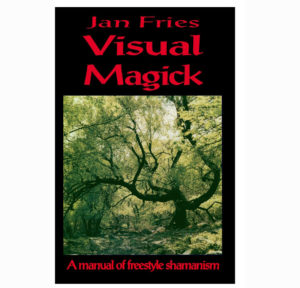A Manual of Freestyle Shamanism
Jan Fries

Visual Magick
A Manual of Freestyle Shamanism
Jan Fries
Format: Softcover
ISBN: 1869928571
£15.00 / US$24.00
Subjects: Sigil Magick/Runes/Shamanism/Chaos Magick
Buy UK Edition
Buy USA Edition
Suitable for all those inspired by such figures as Austin Spare and Aleister Crowley, and who feel the imperative to develop one’s own unique magick way. Visual Magick aims to build vision, imagination, and creative magick. It shows how magicians, witches, artists and therapists can improve visionary abilities, enhance imagination, activate the inner senses, and discover new modes of Trance awareness. The emphasis is on direct experience and the reader is asked to think, act, do, and enjoy as s/he wills.
More information
Visual Magick began as a small treatise on sigil Magick and automatic drawing circulated privately amongst members of the Maat network and is written for practising mind explorers of the unorthodox variety.
Review for Pentacle Magazine www.pentaclemagazine.org by Kate Hoolu
‘No matter what the medium, a talented priest can communicate … without preaching or didacticism. Art shows rather than tells. All great artists function as priests, whether they think of themselves as priests or not.’
If you are an eclectic magickian or shaman or have any interest in Austin Osman Spare, this is a book for you. Spare said, “All desire, whether for pleasure, knowledge, or power, that cannot find ‘natural’ expression, can by sigils and their formula find fulfilment from the subconscious”. This book is at least in part a modern view of the sigil magick that derives from AOS. But it is much, much more.
Fries has written on several subjects, including the Tao and Rune magick, but this work shows very good awareness and ability with Spare’s techniques, cross-fertilised with some of the more well-known methods of shamanism and his own innovations; hence the subheading.
Fries makes the important point that sigils can not only be designed by the operator (for whatever magickal purpose) but also RECEIVED from entities too… and in those cases, there is often a useful secret to be discovered within the sigil: “it should be noted that, while the sentience behind these sigils appears independent, their aesthetics are usually suited to the personality of the receiver. The best kind contains a blend of known and unknown…half-revealed and half-concealed”. This also stands as a beautifully short summary of perhaps what Aleister Crowley and the Book of the Law are about- obviously it is in AC’s writing style, but has so much more within… And Kenneth Grant’s work on the Tunnels of Set is supposedly largely based on received sigils.
Regardless of the occult debate about whether these received messages derive from a neurological or a non-human source, which is not within the scope of this review, it makes perfect sense for them to appear in this ‘mixed’ manner. If they were completely incomprehensible they would be ignored, and if they were completely ordinary and fully known already, then they would be un-remarkable and pass from consciousness as quickly as yesterday’s newspaper headlines. The half-unknown element makes them all the more tempting and interesting to the magickian, like a partly open door…
Avalanches of really good points are made by JF, which are eminently sensible, humorous and useful. Not for him is gibberish pontificating about very fine points of obscure theory; his stance is very much of the Chaos magician- ‘get off your ass, find what works, use it and keep trying new things and get out of your conditioned tunnel realities, rather than relying on dogmatic magickal techniques that often descend from book to book, unchanged and without ever being challenged. He makes the very important point that you must allow yourself to make mistakes, and perceive them like that, and not as something else that is kinder to one’s often bloated magickal self-view:
‘Failure’ is recognized as a threat to ego… the same ego that so happily pretends to have divine power and authority… and so the whole thing is usually considered a ‘challenge’ or ‘ordeal’ in such cases- anything rather than accept that one might be wrong” – Indeed: in magick, strange things happen, to the point where, as Ramsey Dukes has said (somewhere): “cock-up is the word of the Aeon”
As the title suggests, there is a distinct artistic bent to this work, but you don’t ever need to have sketched anything before to be able to join in with this stuff – it’s not the quality of what you produce, it’s the intent of the experiment: Fries encourages everyone to experiment with drawing sigils, automatic writing etc, but in all of this to take credit or debit for the works created (and the results of using the sigil magick method): “Frequently people need to insist on the ‘automatic’ origins of their creations (and behaviour) when they dare not assume responsibility for them. It’s so much safer to claim ‘I can’t draw but sometimes the spirit of Leonardo comes over me …’ as if that spirit has nothing better to do!… It’s always easier to blame some spiritual agency than to assume the responsibility of recognizing and developing one’s own talents”
Having dealt at length with visual methods, Fries then describes ”Chaos language”, a kind of glossolalia, which can be seen as a way of making auditory sigils with the voice. The book is worth the cover price just for this part. Awesome! Jan Fries:- add him to the growing list of ”people we like”. Superb, inspiring book.’ – KH
‘One of the best books on magick I have read in a long while.’Pagan News
‘A practical modern grimoire.’- The Cauldron
